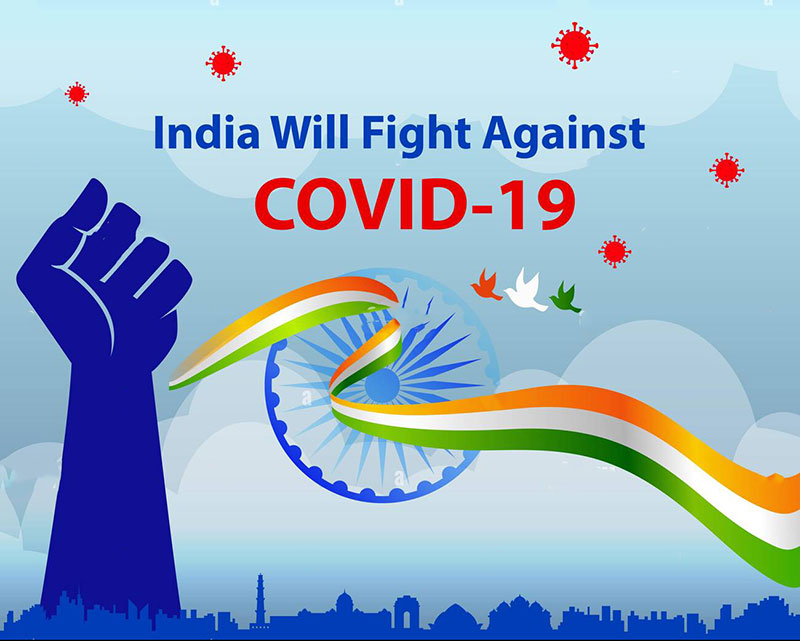
India was fortunate not to be among the first countries hit by COVID-19. The first reported case of infection with the SARS-CoV-2, the virus that causes COVID-19, in India was reported on January 30, 2020 in an Indian student evacuated from Wuhan, and the first death was reported on March 12, 2020. Although it is possible that the SARS-CoV-2 was circulating in India earlier, the first known secondary transmission of the virus within India was reported only in early March.
Even when the case load was low, India was predicted to be at high risk for COVID-19 for a number of reasons. A dense population, especially in urban settings, could exacerbate the spread of SARS-CoV-2. The Indian population has high rates of uncontrolled hypertension1 and diabetes,2 both of which have been shown to be risk factors for severe COVID-19 and mortality. Although children were found less likely to be infected in China3 and other countries, it was unclear how children in India, who have high levels of stunting and early exposure to infections, would fare against SARS-CoV-2.4 On the plus side, it was hypothesized that India’s relatively young population—65% of India’s population is younger than 35 years, and only 6% is older than 65 years—would be spared high mortality from a disease that targets the elderly. In comparison, 22% of the population of Italy and 10% of that of China are older than 65 years.
On January 30, 2020, India confirmed its first coronavirus case in Kerala, but until the beginning of March, the Indian people hadn’t paid much attention to the virus. The government, the ministry of health and family welfare, to be specific, though, had taken note of news trickling in from China about a new disease that had resulted in acute respiratory infections, and activated the Joint Monitoring Group to keep track of developments. By the time India announced a nation-wide lockdown on March 24, India had reported 536 cases in several states, including Delhi, Telangana and Rajasthan, and 10 deaths.
The World Health Organization (WHO) had gotten in touch with China, and soon the world learnt that coronavirus—which affects many different species around the world—had made the jump from an unknown animal species to humans once again. Worst of all, the novel virus, known as severe acute respiratory syndrome-Coronavirus 2, or SARS-CoV-2, was different from the coronavirus (the Severe Acute Respiratory Syndrome or SARS-CoV) that had spooked Hong Kong in 2003. But patients were isolated, and the disease was brought under control. In 2012, another coronavirus, identified first in Saudi Arabia (Middle-East Respiratory Syndrome-Coronavirus, or MERS-CoV) had jumped from bats to camels, and then passed on to humans. So far, MERS-CoV has infected 2,400 people. One-third of them have died. Then, came the novel coronavirus, or SARS-CoV-2, which turned the whole world upside down as we know it.
The first vaccine developed for smallpox, for example, used a living virus to induce immunity from a related virus. The one who developed the vaccine, Edward Jenner, is considered the father of vaccination. Today, the various approaches that are being considered for Covid-19 vaccine development range from vaccines based on weakened living viruses, so they can’t cause the disease, inactivated viruses, viral-vectored vaccines (which involve using viruses to carry the target antigen gene into cells) and protein vaccines, among others. The Serum Institute of India and Indian Immunologicals Ltd, both Indian companies, are developing vaccines based on the first approach; the Indian Council of Medical Research is working with Bharat Biotech on a vaccine using the second approach; and the University of Oxford vaccine, which is developing a vaccine with AstraZeneca and the Serum Institute of India, is using the third approach. The next query on everyone’s mind is when the vaccine, once approved, will become available for people. In India, the government has asked states to jot down priority groups it wants to vaccinate based on vulnerability, like health workers and those on the frontlines fighting the disease, the elderly or those with comorbidities. In October, the government estimated that it’ll vaccinate 20-25 crore people by July next year. For a young healthy adult, the book estimates, vaccines will likely be available in 2022. The year is coming to an end, but the fight to defeat the pandemic goes on.